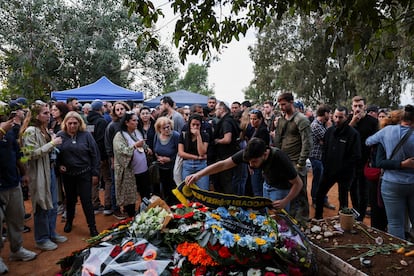The white flag, the symbol of surrender that Israel violated in Gaza
The death of three Jewish hostages by friendly fire increases doubts about the Israeli army’s compliance with international humanitarian law
Pressure on Benjamin Netanyahu’s government has been growing rapidly since the Israeli army acknowledged on Friday that it mistakenly killed three Israeli hostages in an operation in Shijaiyah, a neighborhood on the outskirts of Gaza City. The deceased, later identified as three men in their twenties, “were shirtless and were carrying an improvised white flag” at the time they were shot by a group of soldiers, according to a military spokesperson. International law proclaims that the use of the white flag, one of the most accepted symbols of surrender, protects both civilians and combatants from any attack and, according to experts, disregard for this insignia can be investigated as a war crime.
Alon Shamriz, Samer Al-Talalka and Yotam Haim were part of the group of more than 240 hostages kidnapped by Hamas on October 7. On Friday afternoon, a military spokesman reported that they had died by “friendly fire” in a town north of Gaza. According to initial reports, the soldiers “mistakenly identified” the men as “a threat.” They were alone, possibly fleeing their kidnappers.
The next day, it emerged that the three young men were shirtless, a sign that they did not have weapons on them, and one of them was waving an improvised white flag. According to the Geneva Conventions, the treaties that regulate international humanitarian law and the rules of armed conflict, a white flag “is a flag of truce” reserved for “parlementaires,” a term for individuals who are authorized to negotiate with the enemy during war ― or for people, both civilians and combatants, who seek protection or surrender.
The sequence of events, according to preliminary information provided by military spokesmen, was as follows: shots from Israeli military forces killed two of the men instantly, while a third was injured. They were alone, possibly on the run from their captors. The survivor took temporary refuge in a nearby building, and the soldiers chased him until they found him and shot him at point-blank range.
“If someone surrenders, you should not shoot them,” Marco Sassoli, a professor of International Law at the University of Geneva, said by phone, adding: “According to local media reports, it was possible to identify that [the deceased hostages] were not carrying weapons or explosives. [The soldiers] could have asked them not to advance towards them, instead of shooting.” The Israel Defense Forces (IDF) claimed to have launched an investigation into the case, while Prime Minister Netanyahu said the incident “broke my heart, broke the entire nation’s heart,” although he warned that it would not alter his goal of keeping up the war until Hamas is defeated.

The Israeli army has appealed to the “threat” that the hostages could have potentially posed to explain the incident. The Geneva Conventions, signed by both Israel and Palestine, emphasize that “a feigned intention to negotiate or surrender with the intention of using the white flag as cover for the collection of information might amount to the war crime of perfidy.” In this case, Sassoli suggests, it was not a well-founded fear. “Although there are reports that Hamas has used perfidy during war, shooting should not be the first response, especially if people had their hands in the air and were bare-chested,” he continues.
Shoot first, ask later
The incident triggered a wave of protests in Israel over the weekend, led by the families of the hostages that remain in Gaza (about 120), who fear that their relatives will suffer a similar fate. They are demanding a new negotiation with Hamas for their release. “Israel has to reach another agreement to release prisoners in exchange for kidnapped people. Because just the military operation will not save their lives,” said one of the freed hostages.
A senior Israeli army official insisted to his troops on Sunday that anyone carrying a white flag as a sign of surrender should not be shot, the local media reported. “What if it’s two Gazans with a white flag who come out to surrender? Shall we shoot them? Absolutely not,” this official told his soldiers, as quoted by The Times of Israel. Human rights organizations and Israeli veterans groups feel that the army’s position, putting all the blame on the soldiers, is “a lie.” Ariel Bernstein, a former IDF combatant and a member of the veterans organization Breaking the Silence, said that the Israeli army’s instructions are that “anyone in the combat zone is a terrorist.”
Omar Shakir, director of the Israel and Palestine section of Human Rights Watch, denounced on social media that the deaths of Haim, Shamriz and Talalka “highlight the long-standing practice of Israeli forces of shooting first and asking later […], even those who wave white flags.” In its Sunday editorial, the Financial Times described Netanyahu as a “destructive force” who, due to his unwavering stance, is eroding even the support of his greatest allies such as Germany and the United States.
Hostages should not have been in Gaza—hostage-taking is a war crime. But the killings underscore Israel forces' long-standing practice of shooting first/asking later & track record of unlawfully firing at unarmed people who pose no threat w/ impunity—even those waving white flags https://t.co/vkASg0jde2 pic.twitter.com/GXdHLkSuFz
— Omar Shakir (@OmarSShakir) December 16, 2023
For the moment, Israel’s response has been to attribute sole responsibility for the incident to the soldiers who, if shown to be individually responsible, could be perpetrators of a war crime. Sassoli explains that such acts, which are committed by people (and not a state), can be investigated by the International Criminal Court (ICC), which opened a formal investigation in 2021 into the violence that has occurred in Gaza since 2014. Francisco Rey, co-director of the Institute of Conflict Studies and Humanitarian Action, condemns the inaction of this court. “The ICC is procrastinating the investigation of violations of international humanitarian law in Gaza and the obtaining of evidence must be accelerated,” he said at a news conference on Monday.
Within days of the Hamas attack on Israel, which left 1,200 people dead, the United Nations claimed to be collecting evidence of war crimes by both sides. “As the victims are Israelis, it is most likely that an internal investigation will be opened,” said Sassoli. And he adds: “However, your nationality should not matter. Both Israelis and Palestinians must be protected in the same way, and it is clear that Israel does not comply with international law.”
The death of the three Israeli hostages adds to a long list of fatalities in the war in Gaza, where the death count among Palestinians stands at nearly 20,000 according to Gaza health authorities. Netanyahu has vowed that the offensive will continue “until the end.”
Sign up for our weekly newsletter to get more English-language news coverage from EL PAÍS USA Edition
Tu suscripción se está usando en otro dispositivo
¿Quieres añadir otro usuario a tu suscripción?
Si continúas leyendo en este dispositivo, no se podrá leer en el otro.
FlechaTu suscripción se está usando en otro dispositivo y solo puedes acceder a EL PAÍS desde un dispositivo a la vez.
Si quieres compartir tu cuenta, cambia tu suscripción a la modalidad Premium, así podrás añadir otro usuario. Cada uno accederá con su propia cuenta de email, lo que os permitirá personalizar vuestra experiencia en EL PAÍS.
¿Tienes una suscripción de empresa? Accede aquí para contratar más cuentas.
En el caso de no saber quién está usando tu cuenta, te recomendamos cambiar tu contraseña aquí.
Si decides continuar compartiendo tu cuenta, este mensaje se mostrará en tu dispositivo y en el de la otra persona que está usando tu cuenta de forma indefinida, afectando a tu experiencia de lectura. Puedes consultar aquí los términos y condiciones de la suscripción digital.









































